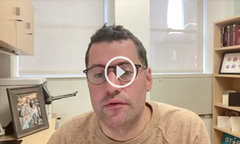
Ropeginterferon Alfa Shows Disease-Modifying Potential in Polycythemia Vera
Douglas A. Tremblay, MD, discusses the data showing disease-modifying potential of ropeginterferon alfa-2b-njft in patients with polycythemia vera.
Episodes in this series

Douglas A. Tremblay, MD, assistant professor of medicine at the Icahn School of Medicine at Mount Sinai in New York, New York, discusses the data showing disease-modifying potential of ropeginterferon alfa-2b-njft (Besremi) in patients with polycythemia vera.
Based on the phase 3, open-label, randomized clinical trial PROUD-PV and its phase 3b extension trial CONTINUATION-PV (NCT01949805, NCT02218047), ropeginterferon demonstrated reduction in JAK2 allele burden, which is a surrogate for reduction of thrombosis and disease progression over the long term. Rates of clinical events were low during the study period, requiring longer-term follow-up to show differences in progression rates.
At 6 years, ropeginterferon had a higher probability of event-free survival which included thromboembolic events, progression, or death (Cox proportional HR, 0.34; 95% CI: 0.12–0.97; P = 0.04) compared with hydroxyurea.1 Tremblay says that the question of how it is disease modifying is still being investigated, but it has been shown that those with lower JAK2 allele burden have fewer events like thrombosis, progression, or death. He says that ropeginterferon is believed to work at the level of the malignant stem cell clone to prevent disease progression, which is an important goal to achieve in polycythemia vera.
TRANSCRIPTION:
0:10 | The data would suggest that there is a signal that this may actually reduce the amount of disease progression there. There are some data that if you give therapy for long enough, it may prevent the disease from progressing. I think it remains still an unanswered question, if this is really disease modifying or not, and it is, is something that I think is is still being worked out. But what has been demonstrated in longer-term follow up from ropeginterferon data is that patients who do have a response in terms of allele burden and mutational reduction do end up having less things like thrombosis, disease progression and death too. We think that the drug works at the level of the stem cell and may prevent the disease from progressing.



















